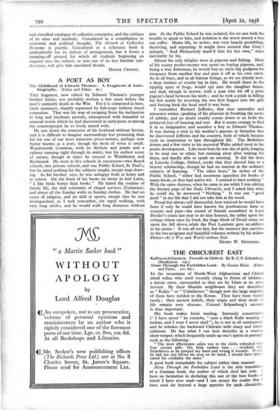A POET AS BOY
The Childhood of Edward Thomas : A Fragment of Auto- biography. (Faber and Faber. 6s.)
THIS fragment, now edited by Edward Thomas's younger brother Julian, was probably written a few years before the poet's untimely death in the War. For it is composed in bare, short sentences, sharply separated by full-stops without much connexion. That was his way of escaping from his inclination to long and rhythmic periods, interspersed with beautiful or unusual words which he had discovered in early poets or among the countrypeople he so freely mixed with.
He sets down the memories of his boyhood without favour, and it is difficult to imagine surroundings less promising than his for one of our most attractive prose-writers, perhaps now better known as a poet, though his book of verse is small. Wandsworth Common, with its thickets and ponds and a ,railway running right through its midst, was his earliest scene of nature, though at times he strayed to Wimbledon and Richmond. He went to five schools in succession—two Board schools, two private schools, and one Public School, St. Paul's, but he cared nothing for the subjects taught, except map-draw- ing. As bis brother says, he was unhappy both at home and at school. On the front of his books he wrote in bad Latin,
I like birds better than books." He hated the routine of family life, the dull solemnity of chapel services (Unitarian), and above all the Sunday walks in Sunday clothes. He had no sense of religion, and no skill at sports, except that he was distinguished, as I well remember, for rapid walking, with very long strides, and he would walk long distances without
aim. At the Public School he was isolated, for no one took the trouble to speak to him, and isolation is the worst misery a boy can suffer. Home life, he writes, was very largely grumbling, deceiving, and repenting. It might have seemed that Gray's epitaph, " And Melancholy mark'd him for her own," must inevitably be his.
Almost his only delights were in pigeons and fishing. Most of his scanty pocket-money was spent on buying pigeons, and, being a true fisherman, he would buy an extra big gudgeon for twopence from another boy and pass it off as his own catch. As in all boys, and in all human beings, as we see plainly now, a deep instinct of cruelty lay in him. He would share in the ripping open of frogs, would spy into the slaughter house, and deal, though in horror, with a man who bit off a prize pigeon's head between his teeth ; and he took a pride in killing his fish neatly by inserting the two first fingers into the gills and forcing back the head until it was loose.
I remember Richard Jefferies, - that true naturalist and attractive writer, speaking of his pleasure in breaking the necks of rabbits, and no doubt cruelty comes down to us froin the primeval joys of hunting and war. But it seems strange to find it in so imaginative and sensitive a boy as Edward Thomas. It was during a visit to his mother's parents at Swindon that he discovered Jefferies and his country, both of which became such an inspiration to him throughout life. The Berkshire downs and a few visits to his ancestral Wales added most to his poetic development. Like most boys he was shy of girls, longing to be near one or other, but running away after waiting for them, and hardly able to speak on meeting. It did the dons at Lincoln College, Oxford, credit that they elected him to a history scholarship, though he had no interest in the ordinary subjects of learning. " The other boys," he writes of the Public School, " either had enormous appetites for books of many kinds, or they had native wit. I seemed to have nothing." With the same shyness, when he came to me while I was editing the literary page of the Daily Chronicle, and I asked him what he could do, he answered " Nothing." It was one " good deed " in my life that I did not take him at his word.
Proud but always self-distrustful, how rejoiced he would have been if only he could have known his posthumous fame as essayist and poet—the crowd of friends assembled in Lord Horder's estate last year to do him honour, the tablet upon the cottage where once he lived, the huge block of Druid stone set upon the hill above, while the Poet Laureate gave an address in his praise ! It was all too late, but his memory also survives in the two poignant and beautiful volumes written by his widow Helen—As it Was and World without End.
HENRY W. NEVINSON.










































 Previous page
Previous page